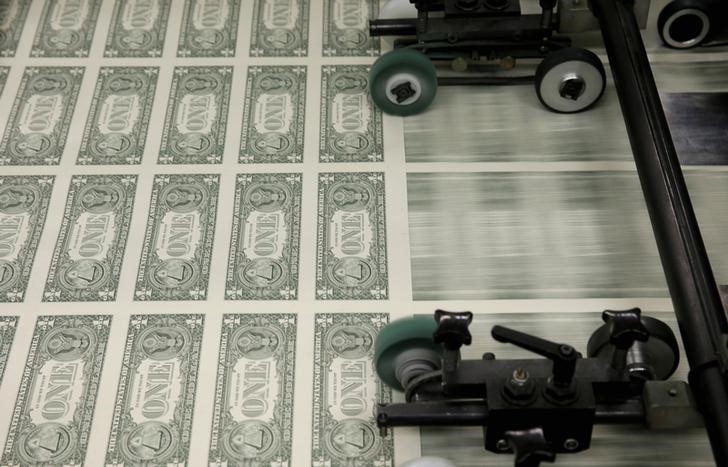Investing.com - The dollar pared gains against a basket of other major currencies on Friday, after data showed the U.S. economy grew at a slower rate than expected in the fourth quarter, fuelling fresh concerns over the strength of the recovery.
In a report, the U.S. Bureau of Economic Analysis said that fourth quarter gross domestic product rose 2.2%, in line with a preliminary estimate but below expectations for a growth rate of 2.4%.
The U.S. dollar index, which measures the greenback’s strength against a trade-weighted basket of six major currencies, was steady at 97.63, down from highs of 98.20 hit earlier in the session.
EUR/USD was down 0.20% to 1.0864, just off session lows of 1.0801.
Sentiment on the euro remained vulnerable after Greece failed in a bid on Wednesday to secure a quick cash payment from the euro zone rescue fund to help stave off potential bankruptcy next month.
Athens had appealed for the European Financial Stability Facility to return €1.2 billion it said it had overpaid when it transferred bonds intended for bank recapitalization this month.
The Greek government is expected to present a detailed list of proposed reforms to its eurozone partners by next Monday.
The pound remained higher, with GBP/USD up 0.38% to 1.4909.
Demand for sterling strengthened after Bank of England Governor Mark Carney said that the central bank's next move on interest rates would be upward.
Earlier Friday, the Nationwide Building Society reported that U.K. house prices rose 0.1% this month, disappointing expectations for a 0.2% gain, after a 0.1% downtick in February.
Elsewhere, the dollar edged lower against the yen, with USD/JPY easing 0.08% to 119.08 and remained moderately higher against the Swiss franc, with USD/CHF up 0.10% to 0.9639.
In Japan, official data earlier showed that household spending rose 0.8% in February, exceeding expectations for a 0.5% gain, after a 0.3% fall the previous month.
A separate report showed that consumer price inflation in Japan rose at an annualized rate of 2.0% in February, compared to expectations for 2.1% and down from 2.2% in January.
Data also showed that Japan's retail sales dropped at an annualized rate of 1.8% last month, confounding expectations for a 1.5% decline, after a 2.0% drop in January.
The Australian and New Zealand remained broadly weaker, with AUD/USD retreating 0.38% to 0.7799 and NZD/USD shedding 0.23% to 0.7583. Meanwhile, USD/CAD held steady at 1.2487.
The commodity-linked loonie also weakened on the back of dropping oil prices, as upbeat U.S. data overshadowed concerns over a supply disruption in the Middle East following news Saudi Arabia launched air strikes in Yemen this week to counter Iran-backed Houthi rebels.
Later in the day, the U.S. was to release the revised reading of the University of Michigan consumer sentiment index.
